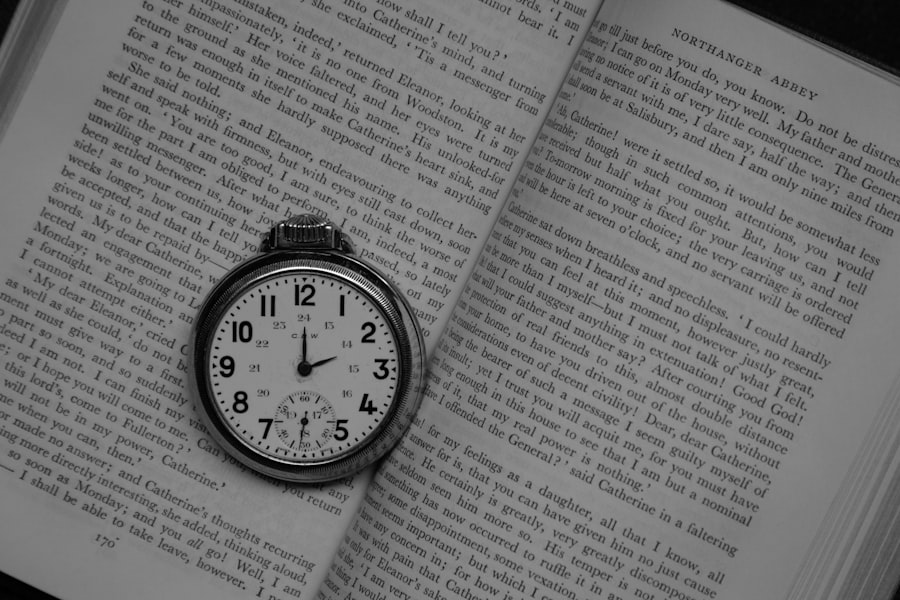Subjective time refers to the personal experience of time, which can differ significantly from the objective measurement of time. While clocks and calendars provide a standardized way to quantify time, individuals often perceive its passage in a manner that is deeply influenced by their experiences, emotions, and mental states. This phenomenon suggests that time is not merely a linear progression of moments but rather a complex interplay of psychological factors that shape how one experiences the flow of time.
For instance, during moments of joy or excitement, time may seem to fly by, while periods of boredom or distress can stretch moments into what feels like an eternity. The subjective nature of time can also be influenced by age and life experiences. Children, for example, often perceive time as moving more slowly than adults do, likely due to the novelty of their experiences.
Each new event or milestone can feel monumental, creating a sense of prolonged time. Conversely, as individuals grow older and accumulate experiences, they may find that time appears to accelerate. This acceleration can be attributed to the relative familiarity of experiences and the tendency to categorize them into broader life narratives, which can compress the perception of time.
Key Takeaways
- Subjective time varies based on individual perception, emotions, and attention.
- The brain processes time through complex neural mechanisms influenced by sensory input.
- Emotional states can cause time to feel like it is speeding up or slowing down.
- Cultural and social contexts shape how people experience and interpret time.
- Understanding subjective time has practical applications in psychology, productivity, and well-being.
The Relationship Between Perception and Time
Perception plays a crucial role in how individuals experience time. It is not merely a passive reception of temporal information; rather, it is an active process that involves interpretation and contextualization. The brain continuously integrates sensory information to create a coherent understanding of the present moment, which in turn influences how time is perceived.
For example, when engaged in an enjoyable activity, the brain may prioritize positive stimuli, leading to a perception of time passing quickly. In contrast, during monotonous tasks, the lack of engaging stimuli can result in a heightened awareness of time’s passage. Moreover, the relationship between perception and time is further complicated by cognitive biases and individual differences.
Some people may have a heightened sensitivity to temporal changes, allowing them to notice minute shifts in their environment that others might overlook. This sensitivity can lead to variations in how long or short an event feels based on personal engagement and focus. Thus, perception acts as a lens through which individuals interpret their temporal experiences, shaping their understanding of past, present, and future.
How the Brain Processes Time

The brain’s processing of time is a sophisticated and multifaceted operation that involves various neural mechanisms. Research has identified specific areas of the brain that are particularly active during temporal judgments, including the prefrontal cortex and the basal ganglia. These regions work together to encode temporal information and help individuals estimate durations and intervals.
The brain’s ability to process time is not limited to conscious awareness; it also operates at subconscious levels, influencing behaviors and reactions without explicit thought. Neuroscientific studies have shown that the brain’s internal clock can be influenced by external factors such as rhythm and tempo. For instance, music with a steady beat can alter an individual’s perception of time, making it feel as though time is moving faster or slower depending on the tempo.
Additionally, the brain’s processing of time is not uniform; it can vary based on context and individual differences in attention and cognitive load. This variability highlights the complexity of temporal processing and underscores the importance of understanding how different factors can shape one’s experience of time.
The Role of Emotions in Time Perception
| Emotion | Effect on Time Perception | Typical Time Distortion | Example Study Findings |
|---|---|---|---|
| Fear | Time dilation (time feels slower) | Overestimation by 20-50% | Participants exposed to threatening stimuli perceived intervals as longer |
| Happiness | Time contraction (time feels faster) | Underestimation by 10-30% | Positive mood led to shorter duration estimates in timing tasks |
| Anger | Mixed effects; often time dilation | Variable; sometimes overestimation by 15-40% | Heightened arousal from anger increased perceived duration in some studies |
| Sadness | Time contraction or no significant change | Underestimation or neutral | Some studies show slower passage of time, others no effect |
| Neutral | Baseline time perception | Accurate or minimal distortion | Control condition in most experiments |
Emotions play a pivotal role in shaping how individuals perceive time. When people experience strong emotions—whether joy, fear, or sadness—their perception of time can be significantly altered. For example, during moments of intense fear or anxiety, individuals may feel as though time has slowed down.
This phenomenon is often attributed to the brain’s heightened state of alertness during stressful situations, which allows for more detailed processing of sensory information. As a result, individuals may recall events from these moments with greater clarity, leading to the impression that more time has passed than actually has. Conversely, positive emotions can create a sense of time flying by.
When individuals are engaged in activities that bring them joy or fulfillment, they often lose track of time altogether. This experience is sometimes referred to as “flow,” where one becomes so immersed in an activity that the passage of time becomes irrelevant. The interplay between emotions and time perception illustrates how subjective experiences can shape one’s understanding of temporal reality, highlighting the intricate connections between feelings and the perception of time.
Time Dilation and Contraction
Time dilation and contraction are concepts that illustrate how subjective experiences can alter one’s perception of time’s passage. Time dilation refers to the phenomenon where time seems to slow down during intense experiences or crises. This effect has been documented in various contexts, such as during life-threatening situations or extreme sports activities.
In these moments, individuals often report feeling as though they have more time to react or process information than they would under normal circumstances. On the other hand, time contraction occurs when individuals are engaged in enjoyable or stimulating activities. In these instances, people may feel as though hours have passed in mere minutes.
This phenomenon can be attributed to the brain’s focus on positive stimuli and its tendency to compress less significant moments into broader categories. Both dilation and contraction highlight the fluidity of subjective time and emphasize how personal experiences can dramatically influence one’s perception of temporal reality.
The Influence of Attention on Time Perception

Attention is a critical factor in shaping how individuals perceive time. The brain allocates cognitive resources based on what it deems important or relevant at any given moment.
For instance, when engrossed in a captivating book or movie, one may lose track of hours as they become fully absorbed in the narrative. Conversely, when attention is divided or distracted—such as during multitasking—individuals may become acutely aware of the passage of time. This heightened awareness can lead to feelings of impatience or frustration as they wait for tasks to be completed.
The relationship between attention and time perception underscores the importance of mental engagement in shaping one’s experience of temporal flow. By understanding this connection, individuals can better manage their focus and enhance their overall experience of time.
The Illusion of Time
The illusion of time is a fascinating aspect of human perception that reveals how subjective experiences can distort one’s understanding of temporal reality. Many people have experienced moments where they felt as though time was standing still or moving at an accelerated pace without any objective basis for such perceptions. This illusion arises from various cognitive processes that influence how individuals interpret their experiences.
One common example is the phenomenon known as “time flies when you’re having fun.” This illusion occurs when individuals are engaged in enjoyable activities that capture their attention and immerse them in positive emotions. In contrast, during periods of boredom or discomfort, individuals may feel as though time drags on endlessly. The illusion of time serves as a reminder that human perception is not always aligned with objective reality; rather, it is shaped by personal experiences and emotional states.
Cultural and Social Factors in Time Perception
Cultural and social factors play a significant role in shaping how individuals perceive and understand time. Different cultures have varying attitudes toward punctuality, leisure, and the value placed on time management. For instance, some cultures prioritize strict adherence to schedules and deadlines, while others adopt a more relaxed approach to temporal organization.
These cultural differences can influence how individuals experience the passage of time in their daily lives. Social interactions also impact perceptions of time. Engaging with others can create shared experiences that alter one’s sense of temporal flow.
For example, group activities often lead to a collective sense of enjoyment that can make time feel more expansive. Conversely, social isolation may lead to a heightened awareness of time’s passage as individuals grapple with boredom or loneliness. Understanding these cultural and social influences on time perception can provide valuable insights into how people navigate their lives within different contexts.
The Connection Between Memory and Time
Memory plays an integral role in shaping how individuals perceive time. The way memories are formed and recalled can significantly influence one’s understanding of past events and their relationship to the present moment. When recalling significant life events—such as milestones or traumatic experiences—individuals often find that these memories are imbued with emotional weight that alters their perception of how much time has passed since those events occurred.
Moreover, the act of remembering itself can create distortions in temporal perception. For instance, when reflecting on a particularly eventful year filled with significant changes or experiences, individuals may feel as though that year lasted longer than it actually did due to the richness of their memories. This connection between memory and time highlights how subjective experiences shape one’s understanding of temporal reality and underscores the importance of personal narratives in constructing one’s sense of self over time.
Time and the Perception of Space
The relationship between time and space is another intriguing aspect of human perception that reveals how interconnected these dimensions are in shaping experiences. Individuals often perceive space through a temporal lens; for example, when navigating through familiar environments, they may rely on memories associated with those spaces to guide their movements over time. This interplay between spatial awareness and temporal understanding creates a dynamic framework for experiencing the world.
Additionally, certain spatial configurations can influence perceptions of time itself. Research has shown that environments designed with specific layouts—such as open spaces versus confined areas—can affect how quickly or slowly individuals perceive time passing within those spaces. This connection between space and time perception underscores the complexity of human cognition and highlights how various environmental factors contribute to one’s overall experience.
Practical Implications of Understanding Subjective Time
Understanding subjective time has practical implications across various fields, including psychology, education, and even workplace productivity. By recognizing how emotions, attention, cultural factors, and memory influence perceptions of time, educators can design learning environments that enhance student engagement and retention. For instance, incorporating enjoyable activities into lessons may help students perceive learning as more rewarding and less tedious.
In professional settings, awareness of subjective time can inform strategies for improving productivity and employee satisfaction. By fostering environments that promote focus and engagement—such as minimizing distractions or encouraging breaks—organizations can help employees manage their perceptions of time more effectively. Ultimately, understanding subjective time allows individuals to navigate their lives with greater awareness and intention, leading to more fulfilling experiences across various domains.
From emotions to attention and cultural influences, each element contributes to a rich tapestry of temporal experience that varies from person to person. By exploring these dimensions further, one can gain valuable insights into the nature of human perception and its implications for everyday life.
The physics of subjective time is a fascinating topic that explores how our perception of time can differ from the objective measurement of time. For a deeper understanding of this concept, you can read the related article on the subject at Freaky Science, which delves into the intricacies of how our brains process time and the implications of these perceptions in various contexts.
WATCH THIS! The Glitch Is Real: Why Physics Says Time Is Breaking Down
FAQs
What is subjective time?
Subjective time refers to the personal perception of the passage of time, which can vary from one individual to another and can be influenced by psychological and physiological factors.
How does physics relate to subjective time?
Physics studies objective time as a measurable quantity, but it also explores how time is experienced differently due to factors like motion, gravity, and brain processes, linking physical phenomena with subjective perception.
Can time feel like it moves faster or slower?
Yes, subjective time can seem to speed up or slow down depending on attention, emotional state, and external conditions, even though the objective passage of time remains constant.
What role does the brain play in perceiving time?
The brain processes sensory information and internal signals to create a sense of time flow, involving areas such as the cerebral cortex and basal ganglia, which influence how we perceive duration and intervals.
Does Einstein’s theory of relativity affect subjective time?
Einstein’s theory explains how time can dilate or contract depending on relative speed and gravity, which affects objective time measurements, but subjective time perception is primarily influenced by neurological and psychological factors.
Is subjective time the same for everyone?
No, subjective time varies between individuals and even within the same person under different circumstances, influenced by factors like age, attention, emotions, and mental state.
Can subjective time be measured scientifically?
While subjective time cannot be measured directly, scientists use behavioral experiments, brain imaging, and physiological markers to study how people perceive time intervals and durations.
Why is understanding subjective time important?
Understanding subjective time helps in fields like psychology, neuroscience, and physics to explain human experience, improve mental health treatments, and deepen knowledge of how time relates to consciousness.
